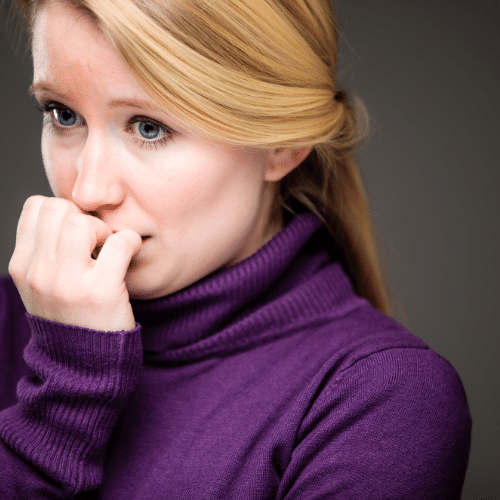Table of Contents
- 1 What Exactly Is Worry?
- 2 The Overall Condition Anxiety
- 3 What’s the Difference Between Worry And Anxiety?
- 3.1 Anxiety vs. Worry
- 3.2 The following are five primary distinctions between worry and anxiety:
- 3.3 Is It Possible That Intense Worry And Anxiety May Trigger Stress Symptoms?
- 3.4 How Does Extreme Anxiety Affect My Body?
- 3.5 In addition to psychological effects, hormones can trigger the following physiological responses:
- 3.6 Excessive Worrying And What To Do About It
What Exactly Is Worry?
Fearful thought about oneself and the outside world is what we mean when we talk about worry.
Typically, this involves worrying about the likelihood of future negative events and/or doubting one’s own resilience.
A worry may be about something that happened in the past, but it is more likely to be about how that something may affect the future.
Anxıety..Almost everyone has anxiety at some point, and it’s natural for that feeling to intensify in the presence of threats or while confronting the unknown.

Worries about loved ones, friends, coworkers, academics, health, and finances are among the most typical types of worries. Although worry can strike out of the blue, it typically results from an external reminder of the worry’s source.
The average individual can usually control their worrying; therefore, it has little effect on their daily lives. Furthermore, everyone experiences worry and anxiety differently in terms of frequency and intensity.
When under pressure, concern can become upsetting in and of itself (that is, worry becomes the problem rather than the feared incident) and disrupt basic psychological processes like sleep and focus.
To worry is to feel unpleasant about or excessively concerned about something. When you worry too much, your brain and body can go into overdrive because you are always thinking about the worst-case scenario.
Continuous fretting can cause severe anxiety, or even panic attacks during the day. Many people who worry excessively report experiencing a feeling of imminent extinction or having irrational anxieties, both of which serve to fuel their anxiety.
Overly anxious people are hypersensitive to their surroundings and the opinions of others; thus, they may perceive every little object or person as a threat.
Every aspect of your life can be negatively impacted by chronic worry. This includes your ability to eat, exercise, socialize, rest, and concentrate at work.
Many people who worry too much have such crippling anxiety that they turn to unhealthy coping mechanisms like binge eating, smoking cigarettes, or abusing drugs and alcohol.
The Overall Condition Anxiety
About 3–4% of the American population suffers from excessive worry above and beyond what is typically encountered by the majority of people on a recurring basis.

It gets out of hand and gets in the way of daily life for some people. Excessive worry is a common symptom of many mental health disorders, including panic disorder, generalized anxiety disorder, and hypochondriasis (an abnormal preoccupation with one’s health).
In contrast, those who suffer from GAD tend to worry about a variety of different things. Instead, those who suffer from generalized anxiety disorder stress about a wide range of issues on a daily basis.
Indeed, those who suffer from general anxiety tend to worry excessively about everything, even the little things.
These concerns typically involve unpleasant scenarios set far in the future that have little likelihood of ever materializing, and they tend to “pop into the mind” without any provocation.
Many individuals mistakenly believe that stressing too much will prevent bad things from happening, despite the fact that worry can lead to problem solving.
They also frequently exaggerate the severity of the feared events relative to their own ability to deal with them. They’ve been experiencing months, if not years, of constant worry and the accompanying sensations of anxiety without any apparent cause.
Symptoms of anxiety include hyperarousal, agitation, irritability, muscle tightness, difficulty concentrating, problems sleeping, and difficulty focusing on tasks.
Depression and other anxiety disorders (such as social phobia or panic attacks) are often companions to generalized anxiety disorder.
Women are more likely to suffer with GAD than males, and those from lower socioeconomic backgrounds are disproportionately affected.
Some people say they have been chronic worry-warts since childhood, while others say it starts in their thirties or forties.Some worry-warts have experienced more traumatic occurrences in their past, which may have contributed to an overall belief that the world is a hazardous place and the individual may not be able to cope with it.
What’s the Difference Between Worry And Anxiety?
Anxiety and concern are natural responses to today’s uncertain and unsettling environment. Despite the fact that we often use these phrases interchangeably, they actually refer to very distinct phenomena with important differences for our health and wellbeing.

According to Jeffrey Devore, MSW, a community mental health psychotherapist at Henry Ford Health, “if folks aren’t a little bit frightened just now, that’s an issue.” “There is a continuum between worry and anxiety. “While they are distinct locations, there is a strong connection between them.”
Anxiety vs. Worry
As a human being, you probably regularly experience some degree of anxiety (or even anxiety). Okay, but what do these words actually mean? Worry, unease, and maybe even tension characterize both of these conditions. They are, however, distinct from one another.
The following are five primary distinctions between worry and anxiety:
1) We carry anxiety within our heads. The effects of anxiety extend beyond the mental realm.
Worries about the day-to-day occur in your mind, but worry often shows up as physical symptoms, as Devore puts it. “There’s a chance you’ll get dizzy or lightheaded.
“Severe hyperventilating has been reported by a few.” Nausea, indigestion, and irritable bowel syndrome are common complaints among worried people.
2) Worry is targeted, whereas anxiety is broad.
Worry is unique and definite, whether you’re worried about getting the coronavirus or attempting to figure out just how you’ll homeschool two kids.
Anxiety is often hard to pin down. You’re uneasy, but it’s hard to put your finger on what exactly is bothering you, which makes it hard to find solutions to problems.
3) Real life causes worry. One of the hallmarks of anxiety is a preoccupation with the worst-case scenario.
In some ways, worrying makes sense. It’s your brain’s method of trying to make sense of an actual, current threat. Worrying makes perfect sense when the things you’re anxious about can actually happen.
Worry can motivate you to take preventative measures against the coronavirus, such as cleaning your hands and wearing a face mask.
However, anxiety causes an exaggerated perception of danger. Anxious people may “see the danger closer to 70%,” as Devore puts it. “So, if the real likelihood of a negative event is 10%, they may perceive it as closer to 70%.”
Anxious people tend to underestimate their resilience, which compounds the problem.
4) Anxiety lasts a long time, while worry only lasts a short time.
Worrying rarely solves anything in the long run. You fret because of a worrying condition (like COVID-19). Anxiety motivates you to employ creative problem-solving strategies.
Anxiety persists even when worries have no basis in reality. It can seriously impair your functioning.
5) Anxiety hinders performance, whereas worry does not.
There’s little chance that you’ll need to fake an illness to avoid paying bills or avoiding food. However, anxiety penetrates into your mind and might make it hard to concentrate and get things done.
“Fear and apprehension are not always harmful. They can even inspire action for improvement “What Devore claims. The goal is to use problem-solving abilities to address your concerns and lessen the likelihood that they may come true.
Is It Possible That Intense Worry And Anxiety May Trigger Stress Symptoms?
Everyday stresses stem from having to deal with an array of competing priorities and expectations. Some instances of daily stressors include having to wait in a long line at the supermarket, getting stuck in traffic during rush hour, having a constantly ringing phone, or having a chronic illness.
The stress reaction is triggered when worry and anxiety reach unhealthy levels.
The stress reaction has two different parts. First, there’s how you think of the difficulty. The “fight or flight” reaction is the second mechanism at play here; it’s an involuntary physiological reaction that causes a rush of adrenaline and puts your body on high alert.
When our ancestors were threatened by predators, the “fight or flight” mechanism helped them avoid becoming a meal. The perils of the wild still persist, despite the fact that we rarely face them today.
There will always be people or situations that test your patience and resolve.
How Does Extreme Anxiety Affect My Body?
Various health issues have been linked to prolonged worry and emotional stress. The issue arises when everyday concerns and anxiety set off the “fight or flight” response.

Hormones like cortisol are secreted by the adrenal glands as part of the body’s natural “fight or flight” reaction. These hormones have been shown to increase glucose and lipid levels in the blood, both of which are used as fuel by the body.
In addition to psychological effects, hormones can trigger the following physiological responses:
- Problems with swallowing
- Lightheadedness
- Constant thirst and a parched tongue
- increased pulse rate
- Exhaustion
- Brain fog
- Focusing difficulties
- Tiredness
- Sore muscles
- Stiffness in the muscles
- Morning sickness
- Nervous vigour
- Fast respiration
- Breathlessness
- Dripping with sweat
- Quaking and jerking
Constant worrying and the release of stress hormones can also have harmful health effects if the surplus energy in the blood isn’t used for exercise.
- Body’s immune suppression
- Ailments of the digestive system
- Stiffness in the muscles
- impairment of working memory
- Inadequate cholesterol levels
- Cardiovascular disease
If anxiety and overthinking don’t get treated, they can lead to a lot of emotional and mental problems, like suicidal thoughts.
These results are a reaction to stress, but stress is really just the catalyst. How you deal with stress will determine whether or not you get sick.
The immune system, the cardiovascular system, and the hormones secreted by specific glands all play a role in the body’s physical reaction to stress. These hormones play an important role in controlling how your brain and nerves work.
Your defense mechanisms and mental health have far-reaching effects on all of these systems. There is no correlation between stress and illness.
,Rather, it is the response itself, such as excessive worrying and anxiety, that may cause physical illness. However, by making some adjustments to your routine, you can modify your reaction.
Excessive Worrying And What To Do About It
When you worry too much or suffer from anxiety, there are many things you can do on your own or with the help of a professional. Some activities to try at home:
Mute the news; it’s stressful just watching it. Three minutes of tv time can teach you the fundamentals and keep you abreast of global events. Beyond that, you’re stuck watching endless loops of the same disturbing news stories, says Devore.
If you suffer from anxiety, taking just five or ten minutes a day to focus on the present moment and be fully present can have a profoundly calming effect. Devore claims that many of his clients use anxiety-relieving apps like Calm and Thrive.
If you find yourself saying, “I can’t do this,” or “I’m stuck,” try replacing those ideas with these two: Is it true? (1) Furthermore, (2) Is it useful?
Anticipatory anxiety is the norm rather than the exception, and anxiety is the main fuel for negative thinking. Putting an end to them with a test of your mettle might be a great way to clear your mind.
Because avoidance is a common symptom of anxiety, practicing gradual exposure to feared situations can help you overcome your fear.
Devore explains that you should “sit in the emotion until you adapt” in order to “desensitize yourself to discomfort.” When patients are also taught techniques for calming themselves down, this “exposure treatment” has the best chance of succeeding.
It’s crucial to do activities every day that allow you to relax and cope with difficult feelings. On the weekends, perhaps you’ll go fishing.
Or maybe you and the kids enjoy going on family hikes or going to the local gym to play some hoops. Don’t skip out on resting and recharging time under any circumstances.
https://psytify.com/personality-types/


